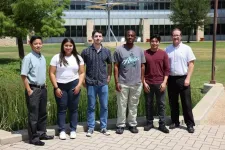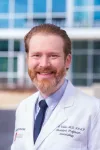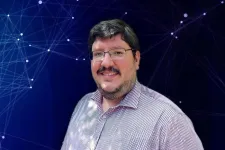(Press-News.org)
A secondary analysis from the SWOG S0931 EVEREST trial has found that in the subgroup of patients with clear-cell renal cell carcinoma (RCC) who were at very-high risk of recurrence, those who were treated with everolimus after surgery had a statistically significant improvement in recurrence-free survival compared to patients getting placebo after surgery.
The results will be presented at the European Society of Medical Oncology (ESMO) Congress 2023 in Madrid, Spain, on Oct. 23, 2023 (poster 1887P) by Primo N. Lara, Jr., MD, lead author on the abstract. Lara is distinguished professor of medicine and executive associate dean for cancer programs at the University of California Davis School of Medicine, director of the UC Davis Comprehensive Cancer Center, and group co-chair-elect of the SWOG Cancer Research Network, a cancer clinical trials group funded by the National Cancer Institute (NCI).
SWOG S0931 is the only phase 3 trial of an mTOR inhibitor given as adjuvant therapy (therapy after surgery) to patients with RCC. The study enrolled more than 1,500 patients with either clear-cell or non-clear-cell RCC who were considered at intermediate risk or very high risk of having their disease recur. Eligible patients were randomized to one year of either everolimus or placebo, both after surgery.
The trial’s primary results, published earlier this year in The Lancet by a team led by S0931 principal investigator Christopher W. Ryan, MD, of Oregon Health and Science University Knight Cancer Institute, found that although recurrence-free survival time was longer for patients on the everolimus arm, the difference narrowly missed meeting the criterion for statistical significance.
The abstract Lara presents at ESMO reports results of a secondary analysis of a subset of these patients – those whose RCC was of clear-cell histology and who were considered to be in the category of very high-risk for disease recurrence.
Among the 699 eligible patients in this subgroup, those on the everolimus arm had a 20 percent lower risk of disease recurrence or death than those on the placebo arm (hazard ratio: 0.80; 95 percent confidence interval: 0.65-0.99; two-sided P value = 0.040).
Importantly, the characteristics of patients in this subgroup – patients with RCC with a clear-cell component whose disease was completely resected and who were considered at very high risk for recurrence – closely resemble those of the patients enrolled to the only two previous clinical trials of adjuvant therapy in RCC that reported positive results. These trials were the S-TRAC and KN546 studies, each of which led to Food and Drug Administration approval of a drug.
“The focus on patients with clear cell RCC at very high risk for recurrence allows researchers to better interpret the results of EVEREST in the context of the modestly positive S-TRAC and KN546 trials,” Lara said.
Among the S0931 patients in the current analysis, Grade 3 or higher adverse events (side effects) were more frequent on the everolimus arm than on the placebo arm (42 percent of patients versus 8 percent). Those on the everolimus arm were also more likely to discontinue treatment. Only 47 percent of patients on this arm completed all treatment as planned, compared to 64 percent of patients on the placebo arm.
Study S0931 is supported by the NCI, part of the National Institutes of Health (NIH), led by SWOG, and conducted by the NIH-funded NCI National Clinical Trials Network (NCTN).
S0931 is funded by the NIH/NCI through grants U10CA180888, U10CA180819, U10CA180820, and U10CA180821 and is supported in part by Novartis Pharmaceuticals Corporation.
In addition to Lara, coauthors on the ESMO abstract include Catherine M. Tangen, of SWOG Statistics and Data Management Center; Elisabeth I. Heath, of Wayne State University/Karmanos Cancer Institute; Mark N. Stein, of Columbia University/Herbert Irving Cancer Center; Maxwell Meng, of University of California San Francisco; Ajjai S. Alva, of University of Michigan Rogel Comprehensive Cancer Center; Sumanta K. Pal, of City of Hope Comprehensive Cancer Center; Igor Puzanov, of Roswell Park Comprehensive Cancer Center; Joseph I. Clark, of Loyola University Chicago Medical Center; Toni K. Choueiri, of Dana-Farber Cancer Institute; Neeraj Agarwal, of Huntsman Cancer Institute, University of Utah; Robert Uzzo, of Fox Chase Cancer Center, Temple Health; Naomi B. Haas, of Abramson Cancer Center, University of Pennsylvania; Melissa Plets, of SWOG Statistics and Data Management Center; Ulka N. Vaishampayan, of University of Michigan Rogel Comprehensive Cancer Center; Brian M. Shuch, of UCLA School of Medicine; Ian M. Thompson, of Children’s Hospital of San Antonio; and Christopher W. Ryan, of Oregon Health & Science University Knight Cancer Institute.
Reference:
“Adjuvant everolimus (EVE) in patients (pts) with completely resected very high-risk renal cell cancer (RCC) and clear cell histology: results from the phase III SWOG S0931 (EVEREST) trial.” Poster presentation 1887P, Monday, October 23, 2023.
SWOG Cancer Research Network is part of the National Cancer Institute's National Clinical Trials Network and the NCI Community Oncology Research Program and is part of the oldest and largest publicly funded cancer research network in the nation. SWOG has 20,000 members in 45 states and nine other countries who design and conduct clinical trials to improve the lives of people with cancer. SWOG trials have led to the approval of 14 cancer drugs, changed more than 100 standards of cancer care, and saved more than 3 million years of human life. Learn more at swog.org, and follow us on Twitter at @SWOG.
END
Media contacts: Lisa Black, lblack@aap.org; or Adam Alexander, aalexander@aap.org
The parent’s universal cry in response to loud music-- “Turn that thing down!” -- is well-founded, as evidence shows that children and teens risk hearing loss by cranking up their personal listening devices. What families may not realize is that children are exposed to potentially harmful noise from infancy and that the effects are cumulative over a lifetime.
The American Academy of Pediatrics discusses the common sources and effects of noise, from infant sleep ...
Four senior bioengineering students at The University of Texas at Arlington have won the Biomedical Engineering Society (BMES) Coulter College for Healthcare Innovation competition for their work on an early detection device for atrial fibrillation.
Brady Killham, Juan Ramirez, Jeannette Santos and Michael Ikefuna, all seniors in UTA’s Bioengineering Department, earned the Best Overall award for their plan to develop FibGuard, a wearable, non-invasive atrial fibrillation early detection device.
UTA competed against teams from Vanderbilt, Purdue, Virginia Tech, Wake Forest, Texas A&M, the University of Oklahoma and Rensselaer Polytechnic ...
BIRMINGHAM, Ala. – Lung development in the fetus occurs at low oxygen tension in the womb, but after a very premature birth, the partly developed lungs of the tiny infants experience far greater oxygen tensions even without the prolonged supplemental oxygen that is often required. This can produce well-known disastrous effects on the structure and function of the neonatal lung, causing the serious lung condition of bronchopulmonary dysplasia in high-risk premature infants.
Using a neonatal mouse model, researchers ...
“The majority of wound infections often manifest themselves immediately postoperatively, so close followup should take place [...]”
BUFFALO, NY- October 20, 2023 – A new research perspective was published in Oncoscience (Volume 10) on October 4, 2023, entitled, “Diagnosis and management of postoperative wound infections in the head and neck region.”
In everyday clinical practice at a department for oral and maxillofacial surgery, a large number of surgical procedures in the head and neck region take place under both outpatient and inpatient conditions. The basis ...
The Brain & Behavior Research Foundation announced it is awarding $10.2 million in Young Investigator Grants to 150 promising early career scientists who are working to identify causes, improve treatments, and develop methods of prevention for psychiatric illnesses that impact millions of people in the United States and around the world.
The 2023 Young Investigators are focused on a broad range of psychiatric illnesses. More than half of the projects are relevant to the study or treatment of depression and schizophrenia. Addiction/substance-use disorders, anxiety, and ...
Cannabis use, even for medical purposes, could make some people sick due to harmful fungi that contaminate the plants.
That is the finding of a recently published peer-reviewed journal article, whose authors recommend further study and consideration of changes to regulations to protect consumers, especially those who are immunocompromised. They examined data, previous studies, and U.S. and international regulations related to the cannabis and hemp industry.
The article was published in Frontiers in Microbiology. It was researched and written by Kimberly Gwinn, professor of entomology and plant pathology at the University of Tennessee Institute ...
Since 2011, California has significantly reformed its criminal justice system, reducing the size of its prison population, with no effect on violent crime and only marginal impacts on property crime statewide. The COVID-19 pandemic furthered decarceration as the state reduced state prison and jail populations to slow the spread of the virus. Concerns emerged that releases under the auspices of COVID mitigation harmed public safety. A new study explored this notion and found no consistent relation between COVID-19-related jail decarceration and violent or property ...
It’s a familiar story to many of us: In prehistoric times, men were hunters and women were gatherers. Women were not physically capable of hunting because their anatomy was different from men. And because men were hunters, they drove human evolution.
But that story’s not true, according to research by University of Delaware anthropology professor Sarah Lacy, which was recently published in Scientific American and in two papers in the journal American Anthropologist.
Lacy and her colleague Cara Ocobock from the University of Notre Dame examined the division of labor according to sex during the Paleolithic era, approximately 2.5 million to 12,000 ...
Felix Parra Diaz, the head of the Theory Department at the U.S. Department of Energy’s (DOE) Princeton Plasma Physics Laboratory (PPPL), has been elected a 2023 Fellow of the American Physical Society (APS). This honor recognizes scientists who have helped advance physics by contributing original research, showing how to apply physics to the worlds of science and technology, or exhibiting excellence in physics teaching.
Parra Diaz was cited for “transformational contributions to the theory ...
ESMO announces Public Policy Manifesto on key issues for oncology to bring to European institutions after 2024 elections.
Studies presented at the ESMO Congress 2023 set new standards of care across a wide range of tumour types.
Madrid, Spain, 20 October 2023 – Evidence is building up that strong political action has the potential to tackle two of our era’s biggest challenges: climate change and the increasing burden of cancer on society. At the opening press conference of the ESMO Congress 2023 taking place 20-24 October in Madrid, Spain, a slew of studies marking meaningful ...




